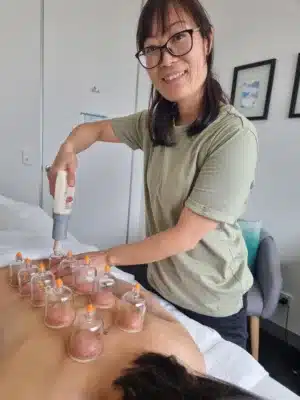Dry Needling Near Me | Trigger Point Therapy Melbourne
 What are the benefits of dry needling (or trigger point therapy)?
What are the benefits of dry needling (or trigger point therapy)?
-
Dry needling has several potential benefits for individuals experiencing muscle pain, dysfunction, or other musculoskeletal conditions.
Here are some of the benefits of dry needling:
-
Pain relief: It can help alleviate pain and discomfort associated with trigger points or other areas of muscle tension.
-
Improved muscle function: By releasing trigger points and reducing muscle tension, It can help improve muscle function and range of motion.
-
Faster recovery: It may help speed up the recovery process from musculoskeletal injuries by improving blood flow to the affected area and promoting tissue healing.
-
Reduced reliance on medication: By addressing the underlying cause of pain or dysfunction, It may help reduce the need for pain medication or other pharmacological interventions.
-
Enhanced athletic performance: It may help improve athletic performance by reducing muscle tension and improving range of motion.
-
Relatively safe and minimally invasive: Dry needling is a minimally invasive procedure that involves few side effects or risks.
I am looking for dry needling near me. How far away is your clinic?
Our Moonee Ponds clinic is within 5km ( just a short drive) from the following suburbs:
- Essendon
- Ascot Vale
- Brunswick West
- Brunswick
- Travancore
- Flemington
- Aberfeldie
- Maribyrnong
- Kensington
- Pascoe Vale South
- Parkville
- North Melbourne
- Carlton North
- Brunswick East
- Coburg
What is dry needling?
Dry needling is a therapeutic technique that involves the insertion of thin, solid needles into specific points on the body, known as trigger points or myofascial trigger points.
These trigger points are areas of muscle tissue that are tense, sensitive, or painful, and may be associated with chronic pain, musculoskeletal injuries, or other conditions.
What does trigger point therapy treat?
Trigger point therapy is a well-tolerated technique for treating many musculoskeletal conditions. It can be used to treat a wide range of conditions, including but not limited to:
- Shoulder pain
- Rotator cuff pain
- Biceps tendinitis
- Iliotibial band syndrome
- Achilles tendonitis
- Low back pain
- Tennis elbow
- Whiplash or neck pain
- Headaches
- Muscle strains
- Hip pain
- Temporomandibular pain, also called TMJ.
They are similar to acupuncture in that both use needles to stimulate the body’s natural healing mechanisms, but the two techniques have distinct differences.
While acupuncture is based on traditional Chinese medicine principles and aims to balance the body’s energy flow, dry needling is based on Western medical principles and targets specific points in the muscle tissue to alleviate pain and muscle dysfunction.
At Qi Medicine, you may receive trigger point therapy from either our qualified myotherapist or acupuncturist, depending on your needs. Your myotherapist is also able to provide remedial massage
and will focus on mainly stress, muscle, and joint tension.
If you choose to have your session performed by an acupuncturist you may also enjoy the benefits of Chinese medicine, which include (and not limited to) looking at digestive complaints, fertility, hormonal imbalances, pregnancy issues, skin complaints, and a host of other issues.
To find out which option would be suited for you, contact the clinic and speak to one of our friendly reception staff.
What happens in a session?
During a session, the practitioner will insert needles into the trigger points and may move them around or manipulate them to stimulate the tissue.
The needle may also cause a twitch response, which is an involuntary contraction of the muscle fibers that can help release tension and improve muscle function.
Therapy is often used as part of a comprehensive treatment plan for conditions such as back pain, neck pain, shoulder pain, tennis elbow, and other musculoskeletal problems.
 How many sessions of dry needling will I need?
How many sessions of dry needling will I need?
The number of sessions required to achieve optimal results can vary depending on several factors, including the severity and duration of the condition being treated, your response to treatment, and the overall treatment plan.
During an initial consultation, the practitioner will assess your condition and create a personalized treatment plan that includes the recommended number of sessions.
They may also periodically evaluate progress and make adjustments to the treatment plan as needed to ensure the best possible outcomes for you.
Is dry needling painful?
Does it actually work?
The Qi Medicine team
Find out about our amazing team here!
Claiming your session with private health rebates

Our therapist is registered with all Australian health funds, and we have HICAPS on-the-spot claiming for your treatments.
You may be able to claim the cost of your acupuncture through your private health insurance. Please contact your health provider to find out exactly how much you will get back per session, as this does vary from fund to fund.
Treatment cost
See our pricing page here
Dry needling Melbourne bookings
Are we easy to get to?
Find us on Google maps here
The clinic is located at Suite 4, Level 1, 151 Pascoe Vale Rd, Moonee Ponds. (Please ensure you take the ground floor elevator to reach us or level one.)
We provide massage and myotherapy services to the North Western suburbs of Melbourne and are close to Highpoint.
Qi Medicine is minutes away from Ascot Vale, Essendon, Avondale Heights, Maribyrnong, and Brunswick West. We also service many clients with acupuncture and Chinese medicine in Travancore, Flemington, Aberfeldie, and Maidstone, and we are just 10 km from Melbourne City.


